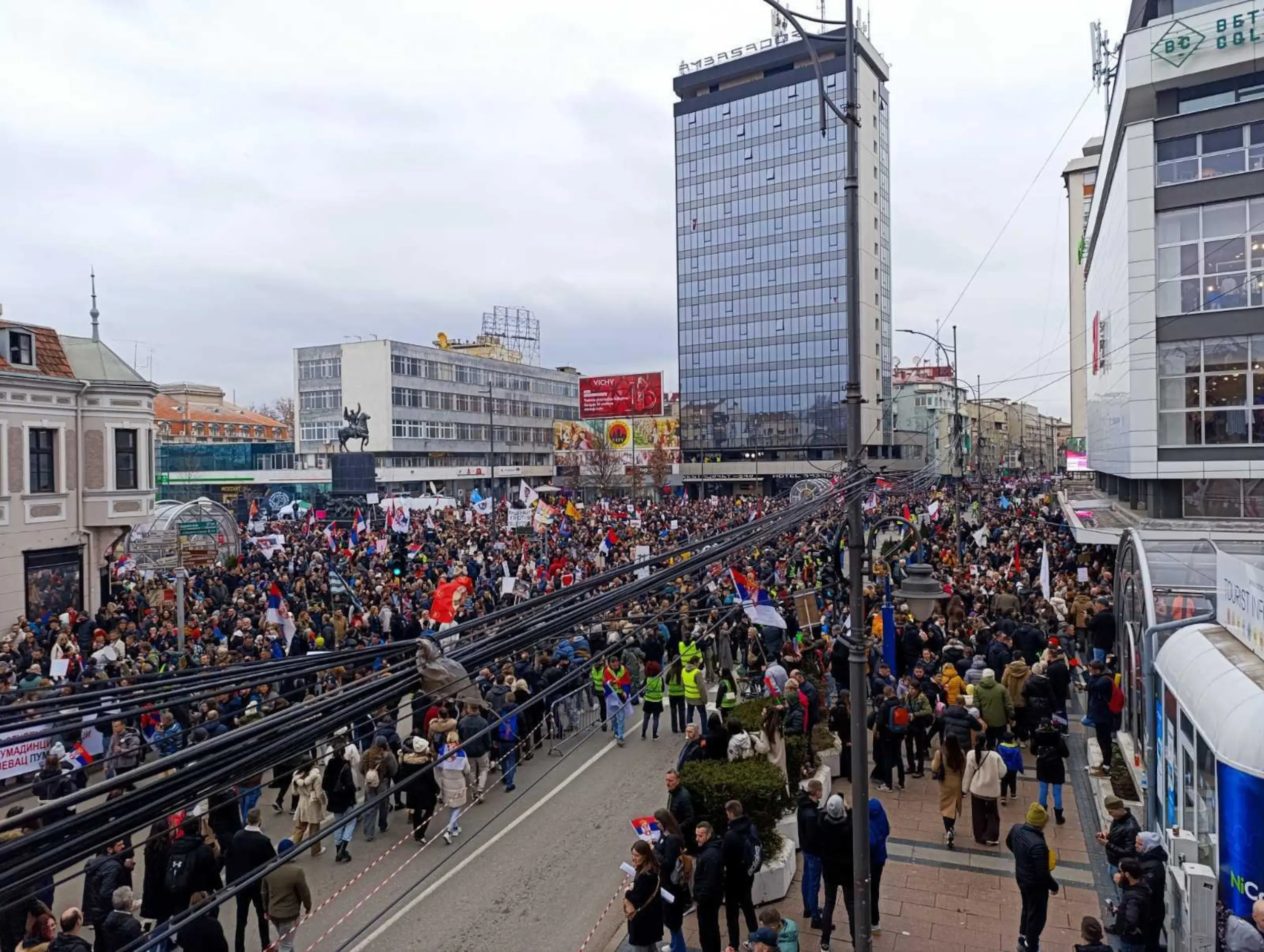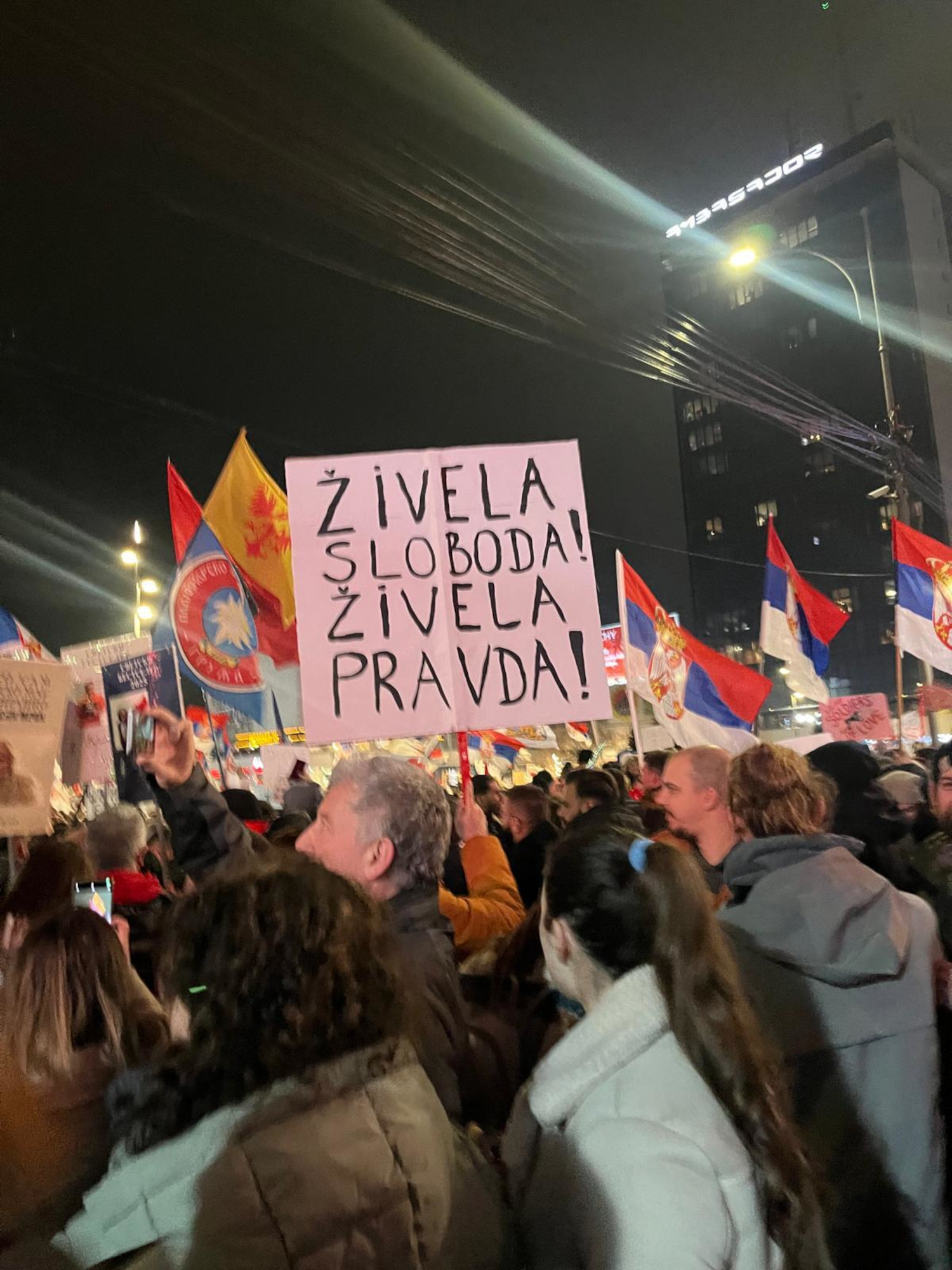Serbia, students and emperors
Protests in Serbia continue. On March 1st, a new protest was held in Niš. With a bit of irony, students issued the “Students’ edict”. Vučić reacted harshly, attacking the students and the media outlets that cover the demonstrations

Serbia-students-and-emperors
Protests in Niš, 1 march 2025 @ Milena Šošić
The Roman Emperor Constantine the Great (272-337 AD) is mostly known for the Edict of Milan of 313, also known as “Edict of Constantine”, which allowed freedom of religion and stopped the persecution of Christians in both the Eastern and Western Roman Empire. Not everybody knows that Constantine was born in the Roman town of Naissus, which is today’s Niš in Serbia. A few Roman mosaics remain in the municipality of Mediana today.
In more recent times, Niš was also the first Serbian city to rebel against Milošević regime in 1996, when it was ruled by the coalition Zajedno. In even more recent times, in summer 2024, Niš was the place where, in the 2024 administrative eleections, a local opposition party, led by a well-known doctor, Dr. Dragan Milić, came very close to securing the majority in the city against the ruling SNS troubled by internal disputes.
Eventually SNS secured the votes for the election of the Mayor, but the municipality of Mediana became the first, and only, municipality in Serbia to be ruled by an opposition party.
Last Saturday, Niš, after Belgrade, Novi Sad and Kragujevac, was also the latest destination of the students’ protest in Serbia, which has been ongoing following the collapse of the canopy of the station in Novi Sad on November 1st. On March 1st, as it happened before, students arrived in Novi Sad on foot and by bicycle from other cities in Serbia. They were joined by thousands of citizens who warmly greeted them.
Serbia, land of free people
In Niš, the students, with a bit of irony, adopted the “Students’ Edict ”, mimicking Constantine’s edict. The edict was read out loud in the main square in front of tens of thousands persons who gathered there. Its English translation reads as follows:
About freedom
Serbia is a land of free people. Freedom is not a privilege but a fundamental right, inseparable from the dignity of every citizen. It is the foundation of our democratic society, our laws, our words, and our thoughts.
About the State
The state is a common good for all its citizens. Serbia’s institutions must serve the people and be a foundation of trust, not an instrument of individual power. We stand for a state where the law is the supreme authority, and where political office means serving the citizens, not a privilege.
About justice
Justice is the foundation of a stable society. An independent judiciary, free media, and institutions must operate according to the law, not under political pressure. Equality of rights must be a reality for every citizen of Serbia.
About youth
Young people have shown that they are not just the heirs of Serbia but those who defend its Constitution. Students, as the leaders of this struggle, safeguard the values on which our society should be built. The youth of Serbia demands a system based on effort and knowledge.
About dignity
We stand for a society where the dignity of every individual is respected. Dignity means that no one should be placed in a position of humiliation because of their beliefs and opinions. Serbia must be a country where experts are not undervalued, where knowledge is valued more than obedience, and where young people see hope in their homeland.
About knowledge
Knowledge is the foundation of progress for every society. We seek a Serbia that invests in science, research, education, and culture as priorities for its development. Universities must be independent centers of excellence, not arenas where to buy diplomas and to exert political influence.
About solidarity
The roads of our cities, from Niš to Novi Sad, from Belgrade to Kragujevac, testify to the strength of national unity. This solidarity, previously unknown in systems based on division, is becoming our pledge and our strength, one we will defend and nurture. By turning individual voices into a force for change, we have proven that Serbia is not a collection of divided interests but a community of citizens who share a vision of the future.
About the future
Let this edict be our duty, our promise to one another—that we will build a state that belongs to all, where every child can dream big. A state where justice and freedom are stronger than any individual, where power does not use the people but serves them.
The reply from the President
The President of Serbia, Vučić immediately replied to the gathering in Niš. While the government and the presidency have been trying for months to defuse the protests or to organise some contra-meetings, this time Vučić’s reply sounded much harsher and threatening than before.
“After each failed coloured revolution, there is always a successful counterrevolution! ” he announced at a party meeting in the eastern towns of Zaječar and Bor, where he stated that Serbia will manage to defeat the evil from outside which is threatening to destroy the country and blamed the protests for damaging the economy of the country .
In his statement, Vučić also stated that, since the numbers of the protests are decreasing, he expects a radicalisation of the protests: the numbers of the protesters are closely followed and monitored, said the president.
Finally he labeled as “imbecile” the RTS, i.e. state TV, correspondent from Niš who covered the protests. A sudden change of tone towards the national broadcaster that in the last months started reporting about the students’ protests, contrarily to what happened before.
The change in the Presidents’ rhetoric can be considered a display of nervousness as the protests continue, or is it the sign of a dramatic change of attitude by the authorities? Next weeks will tell. On March 15, a large protest is planned in Belgrade.
Featured articles
- Take part in the survey
Serbia, students and emperors
Protests in Serbia continue. On March 1st, a new protest was held in Niš. With a bit of irony, students issued the “Students’ edict”. Vučić reacted harshly, attacking the students and the media outlets that cover the demonstrations

Serbia-students-and-emperors
Protests in Niš, 1 march 2025 @ Milena Šošić
The Roman Emperor Constantine the Great (272-337 AD) is mostly known for the Edict of Milan of 313, also known as “Edict of Constantine”, which allowed freedom of religion and stopped the persecution of Christians in both the Eastern and Western Roman Empire. Not everybody knows that Constantine was born in the Roman town of Naissus, which is today’s Niš in Serbia. A few Roman mosaics remain in the municipality of Mediana today.
In more recent times, Niš was also the first Serbian city to rebel against Milošević regime in 1996, when it was ruled by the coalition Zajedno. In even more recent times, in summer 2024, Niš was the place where, in the 2024 administrative eleections, a local opposition party, led by a well-known doctor, Dr. Dragan Milić, came very close to securing the majority in the city against the ruling SNS troubled by internal disputes.
Eventually SNS secured the votes for the election of the Mayor, but the municipality of Mediana became the first, and only, municipality in Serbia to be ruled by an opposition party.
Last Saturday, Niš, after Belgrade, Novi Sad and Kragujevac, was also the latest destination of the students’ protest in Serbia, which has been ongoing following the collapse of the canopy of the station in Novi Sad on November 1st. On March 1st, as it happened before, students arrived in Novi Sad on foot and by bicycle from other cities in Serbia. They were joined by thousands of citizens who warmly greeted them.
Serbia, land of free people
In Niš, the students, with a bit of irony, adopted the “Students’ Edict ”, mimicking Constantine’s edict. The edict was read out loud in the main square in front of tens of thousands persons who gathered there. Its English translation reads as follows:
About freedom
Serbia is a land of free people. Freedom is not a privilege but a fundamental right, inseparable from the dignity of every citizen. It is the foundation of our democratic society, our laws, our words, and our thoughts.
About the State
The state is a common good for all its citizens. Serbia’s institutions must serve the people and be a foundation of trust, not an instrument of individual power. We stand for a state where the law is the supreme authority, and where political office means serving the citizens, not a privilege.
About justice
Justice is the foundation of a stable society. An independent judiciary, free media, and institutions must operate according to the law, not under political pressure. Equality of rights must be a reality for every citizen of Serbia.
About youth
Young people have shown that they are not just the heirs of Serbia but those who defend its Constitution. Students, as the leaders of this struggle, safeguard the values on which our society should be built. The youth of Serbia demands a system based on effort and knowledge.
About dignity
We stand for a society where the dignity of every individual is respected. Dignity means that no one should be placed in a position of humiliation because of their beliefs and opinions. Serbia must be a country where experts are not undervalued, where knowledge is valued more than obedience, and where young people see hope in their homeland.
About knowledge
Knowledge is the foundation of progress for every society. We seek a Serbia that invests in science, research, education, and culture as priorities for its development. Universities must be independent centers of excellence, not arenas where to buy diplomas and to exert political influence.
About solidarity
The roads of our cities, from Niš to Novi Sad, from Belgrade to Kragujevac, testify to the strength of national unity. This solidarity, previously unknown in systems based on division, is becoming our pledge and our strength, one we will defend and nurture. By turning individual voices into a force for change, we have proven that Serbia is not a collection of divided interests but a community of citizens who share a vision of the future.
About the future
Let this edict be our duty, our promise to one another—that we will build a state that belongs to all, where every child can dream big. A state where justice and freedom are stronger than any individual, where power does not use the people but serves them.
The reply from the President
The President of Serbia, Vučić immediately replied to the gathering in Niš. While the government and the presidency have been trying for months to defuse the protests or to organise some contra-meetings, this time Vučić’s reply sounded much harsher and threatening than before.
“After each failed coloured revolution, there is always a successful counterrevolution! ” he announced at a party meeting in the eastern towns of Zaječar and Bor, where he stated that Serbia will manage to defeat the evil from outside which is threatening to destroy the country and blamed the protests for damaging the economy of the country .
In his statement, Vučić also stated that, since the numbers of the protests are decreasing, he expects a radicalisation of the protests: the numbers of the protesters are closely followed and monitored, said the president.
Finally he labeled as “imbecile” the RTS, i.e. state TV, correspondent from Niš who covered the protests. A sudden change of tone towards the national broadcaster that in the last months started reporting about the students’ protests, contrarily to what happened before.
The change in the Presidents’ rhetoric can be considered a display of nervousness as the protests continue, or is it the sign of a dramatic change of attitude by the authorities? Next weeks will tell. On March 15, a large protest is planned in Belgrade.











